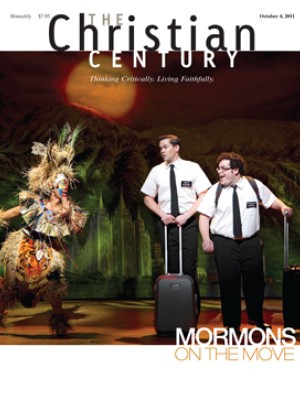Mouw hopes for compromise, connections in PCUSA future
Richard J. Mouw, president of Fuller Theological Seminary and current president of the Association of Theological Schools, has written about the importance of public civility as well as dialogue between Christians of differing views. In August he spoke in Minneapolis to a gathering of the Fellowship of Presbyterians, a group in the Presbyterian Church (U.S.A.) who believe that the denomination has abandoned scriptural standards by, among other actions, deciding to ordain gay and lesbian ministers. The Century spoke to Mouw about the Fellowship and its future.
Was the major topic of conversation in Minneapolis the recent vote by most presbyteries to delete the constitutional requirement of "fidelity in marriage, chastity in singleness" for ordaining church officers?
No. I think there was an underlying conviction that the real issues were much deeper. The discussions were about our commitment to what for many of us is the historic faith and confessional integrity within the Presbyterian context—the authority of scripture, how we interpret scripture and the uniqueness of Christ.
Read our latest issue or browse back issues.
A number of Fellowship of Presbyterians organizers emphasized the desire to be more focused on mission work. Isn't that still possible?
It's hard to do that when, at every meeting we go to, they are always fighting about some vote that's coming up. Many of us were very disturbed to learn that the Presbyterian Church in Mexico just broke relations with the PCUSA over the decision to ordain gay pastors.
What struck you as the most difficult dilemmas facing pastors?
A number of our [Fuller] graduates who are in positions of pastoral leadership are telling me that their people are very angry and want out. Those pastors are struggling with their own conscience: Will I continue to be a pastor to these people and go where they want to go, or is this a test of my leadership? Sadly, at the local level people are quietly leaving congregations because of their distress especially over the passage of the new ordination amendment.
Fellowship leaders planning to create a new Reformed denomination as a haven for conservative congregations have said that in recent years some discontented churches have been able—after negotiations with the PCUSA—to retain their property and transfer into another Presbyterian denomination. Aren't the financial considerations a major obstacle?
It's a big issue for both the PCUSA and for those who want to leave. For one thing, a lot of the churches that have left or would leave are very large congregations. They have been significant contributors to the coffers of the denomination. The big thing for people who think about leaving obviously is the property question.
In fact, wouldn't churches that depart be jumping from the frying pan into the fire—leaving arguments over sexuality and theology for legal and financial disputes?
We would hate to replay scenarios we've seen in the Episcopal Church such as the court fights over property in Virginia and the Los Angeles diocese. I actually once said to the L.A. Episcopal bishop: What if the diocese and its few dissenting congregations had gotten together and put all that money into HIV-AIDS orphanages in Africa and agreed to a gracious separation?
Some people who attended the Fellowship meeting may stay in the PCUSA because their geographical presbyteries are more evangelical-minded. But where does that leave conservative congregations in sharply divided regions?
Some are working on a new kind of presbytery system with different, separate ordaining bodies. Then there is this whole new idea of a kind of Reformed order—people taking vows of fidelity to traditional standards but still staying in touch with the larger church.
I really believe that what we need in our Presbyterian world is a revival of Reformed orthodoxy and missional church life, but also a renewal of connectionalism—this has been a very important motif in Presbyterian life. We are not congregationalists; we believe in mutual accountability of congregations.
Two top PCUSA officials, stated clerk Gradye Parsons and moderator Cynthia Bolbach, attended the gathering. The latter said the energetic discussions on "what's next" struck her as "good for the church." Is that a good sign?
We can't cut off conversations with those we disagree with. That happens on the left as well as on the right. I have a lot of good friends in the Presbyterian Church in America, the most conservative group. But people on the left don't want to have anything to do with them. We have a lot to learn from people with whom we disagree. I've learned a lot from the left about racism, gender equality and concern for the environment. The one thing that conservatives in the PCUSA must not do is go off into a corner.





